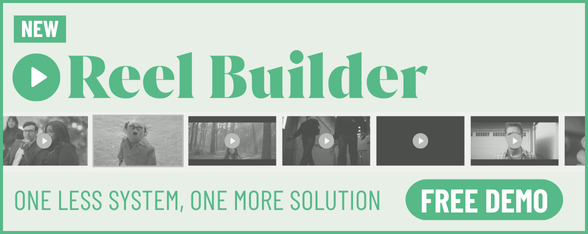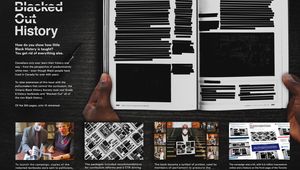
How Design-Thinking Is Fuelling Reinvention at DDB Canada

Megan Hardisty joined DDB Canada as SVP, managing director in June of 2020. Since then, the agency has been undergoing somewhat of a reinvention. Megan and the team at DDB Canada have been investing in more of a design-thinking methodology, bringing clients into the process earlier. It’s a model familiar to DDB North America thanks to the setup in San Francisco, which we documented here.
They've also been leaning heavily into the data expertise of TrackDDB to inform creative. TrackDDB's capabilities have also been embedded across North America, serving US offices and clients now too.
The reinvention in Canada is akin to similar happenings across North America, which we spoke to North America CEO Justin Thomas-Copeland about earlier this year. To get the full Canadian scoop, LBB's Addison Capper chatted with Megan.
LBB> You wrote in Strategy that DDB Canada had to ask itself, ‘Who are we and where do we want to go?’ One year into your role at the agency, how do you answer that question now?
Megan> We've leaned into having the best of both worlds. We have the freedom to look at ou market and regional nuances and respond to them accordingly while also breaking down a lot of those artificial silos and connecting more with our North American and global teams. It's been a real flip into how to look regionally but operate from a global perspective. Globally we've rolled out our vision of Unexpected Works and the belief that creativity is at its most powerful when it's unexpected. That's helped give us the permission to think and behave differently, build our teams differently, and challenge the status quo in how we work internally and ultimately with our clients.
It's been a really nice evolution from where it was when I started. Our teams have embraced the uncertainty of the last year. Rather than fight against it - with this permission to challenge the status quo - everybody's become passionate and eager to get into it.
LBB> Why was that question necessary at the time? What position was the agency in when you joined as MD?
Megan> The agency has gone through a lot of change over the last few years, combined with the uncertainty of COVID and working remotely. Everyone was taking stock and reassessing what they valued and where they wanted to go. If we have to look for positives coming out of the pandemic, it's that it gave us time to reflect. There were legacy processes and ways of working that we needed to evolve. That had been happening prior, but it was enhanced or accelerated based on COVID.
LBB> Since joining the agency you've been implementing practices that borrow from the design world and bring clients into the creative process earlier. Can you speak a bit more about that approach and why it's proving fruitful?
Megan> It's been really interesting working with John [McCarthy, DDB SF president] because there are some fascinating parallels between San Francisco and Toronto. Toronto tends to be a bit of a tech hub, so there are some interesting considerations when you think about design-thinking. What was critical for us was the human-centered focus of design-thinking and what that meant. For us, it was about our clients first. All of our clients have different realities; personal ambitions, business complexities, market constraints. We can't serve our clients well if we treat them all with the same brushstroke. We've worked really hard to understand each of our client's unique needs and then tailor our ways of working.
This has meant a lot more collaboration, workshopping and breaking down traditional waterfall kinds of approaches. For some clients, they still operate in a more traditional way - which is OK. But what we're trying to do is not force-fit one kind of model on our clients - really to work with them to figure out what will work. And then, of course, it's all the other design thinking principles of agility and nimbleness that have come into play.
LBB> How else have you been reinventing DDB Canada as an agency?
Megan> It speaks to what I was saying before that leadership across Canada has worked hard to break down silos to encourage more collaboration, both internally and with clients.
We have strategists and creatives working side-by-side. We're doing things more sprint-like, which encourages more agility and nimbleness in our methodologies. That's been a significant shift. It also means our people aren't confined by their traditional job title. There's more room for productivity for our clients and the teams can propose ideas and strategies outside of the client briefs.
Our work for the Ontario Black History Society is a great example of that. One of our creative teams was very passionate about the cause and bringing awareness to Black history not being taught within the school system. They did this from a place of passion and desire to do something that would make a difference, and they did it largely on their own. It's great that it's been recognized within the industry, but more importantly, it helped bring awareness to a conversation that needs to be had at a societal level.
LBB> Do you work quite closely with the rest of the North American region?
Megan> We are consistently asked to work on a lot of the client work coming out of the US as we are recognised as great partners. This is really great because historically we've had a bit of imposter's syndrome, feeling like we're not good enough in Canada compared to our global counterparts. We are now being recognised for the incredible talent in the agency.
LBB> Culturally, what have you been trying to build at DDB Canada? What kind of place of work have you tried to build?
Megan> Driving as much transparency as possible has really been key. Because of how we've structured our working engagements, we have fewer silos, it's more open, and there's less hierarchy. Trying to be more agile and nimble means we don't have room for teams of 20 people on a brief. We can't have heavily layered hierarchical teams. This ultimately drives better creativity because you're not bogged down in process and bureaucracy.
It also means that there's more of a culture of shared accountability because everybody that comes to the table isn't confined by their job description. We're all in it together. We have creative and strategic partners who have close relationships with the client; it's not just that account management function. Covid has meant that we've had to create more one-on-ones and even in our calls we've been trying to intentionally find moments to have conversations that aren't necessarily just about the work. It's so easy to very quickly jump into the work and then kind of lose that human interaction.
It's just an anecdote, but I was so pleasantly surprised when we had a new team member join and she made a comment about how she couldn't believe how much laughter there was on all our calls. It seemed like we were having so much fun. That to me was huge because after 18 months of this craziness, if we can still have fun and have some levity in our conversations, that's the culture I want to foster.
LBB> How has business been over the past 12 months or so for the agency? Thinking of retention and new business?
Megan> Reflective of the industry at large. We've been really lucky and I'm really proud to say we've retained our clients. A lot more RFPs are going out and there are shifts happening in the market.
Growth is a huge focus for DDB globally. We've had some really exciting progress with TrackDDB partnering with adam&eveDDB on Jet Blue. For a lot of clients, the work has become more project-based. Things have shifted as they need to evaluate their market and what's happening. Again it reflects the need - and why we've talked about design-thinking - because as the world shifts to more project-based work, we need to be able to operate more nimbly. We need to think about how to structure our teams and our solutions from that perspective.
LBB> DDB Canada has multiple offices. Can you speak about each of them and how they fit within the DDB Canada family?
Megan> Part of the thing that excited me about coming to DDB was that we really can deliver against what we call 'the total customer experience.' We can do big storytelling moments, which DDB is known for. Track DDB, based in Toronto, has the expertise in data analytics and does everything on the CRM side so that helps inform creativity. Then we have TracyLocke, which is our shopper division, that translates those brand experiences into retail programmes. AndersonDDB is our pharma and health division, which provides SMEs in that space. We also have offices across the country, so not only can we deliver the creative from a regional perspective but also at a national scale.
One thing we don't talk about often enough is our Montreal team and why that's so great. Quebec overall has unique opportunities when it comes to audience insights and drivers. Often, agencies and brands will develop creative for the rest of Canada and then adapt it to the Quebec market, which can lose integrity for that audience. Because we have a Montreal team, we can start with the Quebec consumer-focused approach first and then come up with creative, leaning into those unique insights. Sometimes that means that it's two different concepts, one for the rest of Canada and one for Quebec, but sometimes it means that the idea that resonates with Quebec could be carried out for the rest of Canada.
LBB> With everything that we've spoken about in mind, which piece of recent work have you been most proud of and why?
Megan> I'm really proud of the work that our Edmonton office did on the Edmonton Elks. Our Canadian Football League team in Edmonton was called the Edmonton Eskimos for a long time, over 100 years, and they'd been debating about retiring the name because it was considered offensive to some and not reflective of the brand. They decided to change it out of respect for the Indigenous culture but, as you can imagine, changing the name of one of the largest and most awarded CFL teams, there are a lot of diehard fans who didn't want to see the name go. It's a team that's really owned by the community, so they did a lot of stakeholder engagement. There was a lot of collaboration with fans, players, coaches, and the CFL organisation. Whatever they came up with needed to reflect the brand and stand out against other CFL and NFL teams and be long-lasting. As you can imagine, there's so much that goes around the name and all the merchandise and experience with a sports team. The team came up with the Edmonton Elks. It's just beautiful - the work, the design, it's so good. The creative has been so impactful and well received. I'm really proud of them.

LBB> What are your thoughts on the Canadian ad industry in general at the moment?
Megan> We have such amazing talent up here and we don't often get recognized for it. That's why I mentioned that I'm so excited about our teams working more with the US -they're being recognised as being such creative powerhouses. The industry here is eager for more disruption and innovation - smaller budgets challenge us to think more creatively about reaching our audiences.
LBB> What do the coming months hold in store for you all and the agency?
Megan> We're going to have continued growth. There are many exciting opportunities that we're working on. I think 'change.' It's cliche to say, but change is the new constant, which means we can live up to our vision of delivering more of the unexpected.















